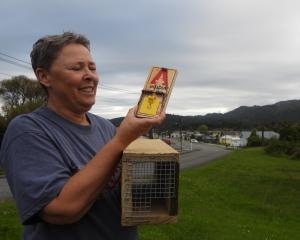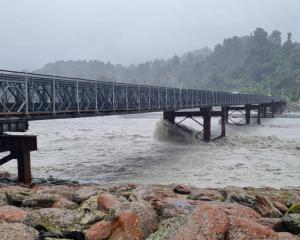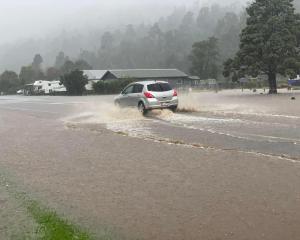
The largest piece was a serpentine boulder weighing 185kg.
West Coast Police area prevention manager Paul Watson said a vehicle towing a trailer with the large rock and a number of smaller rocks identified as pounamu was stopped by police in Greymouth back in March.
The driver said that he had obtained the stone from the Hokitika River.
Inquiries had been ongoing in conjunction with Ngati Waewae.
Chairman Francois Tumahai said they found what was effectively a rock garden containing quantities of serpentine as well as cut and uncut pounamu.
Over 28kg of pounamu was recovered with a retail value of about $18,100 as well 371kg of serpentine, worth $750.
Mr Watson said they were still in discussion with the runanga - the kaitiaki of pounamu in North Westland - as to a course of action, but it could include hefty fines or even prison time.
The penalties upon conviction for any pounamu violation would come under the theft and receiving provisions of the Crimes Act 1961, which carried a maximum seven-year prison sentence for stolen property over the value of $1000.
"There may also be reparation ordered for the value of goods stolen if these were not recovered or damaged."
Mr Tumahai said there was still a large quantity of stone at the property, and it was "unacceptable practice".
"Everyone knows who owns the pounamu and at some point in time we've got to put our foot down."
Since the Ngai Tahu Pounamu Vesting Act 1997 came into effect, the iwi has held the authority for all pounamu between Hokitika and Greymouth, with the exception of the Arahura River, which sits with Mawhera Incorporation.
Pounamu south of the Hokitika River (Rimu) is owned jointly with Makaawhio Runanga.
"You can go on that river and fossick if you are a registered member of Mawhera, and you're allowed to take what you can carry but anything over that needs to be reported back to Mawhera, and it's the same with the rest of the area and our space.
"No one can take anything they can't carry."
Mr Tumahai said most stone was legitimately mined, but there was still a black market.
"We've put a little dent in it with the finder's fee developed with New Zealand Petroleum and Minerals."
Every permit issued from NZPM went with a letter stating who owned the pounamu and who to contact if it was found.
"It has been quite popular with the good miners, but then there's the hard core ones out there that you'll never change that are continuing to use the black market, and these are the ones we are trying to squeeze.
"We are the owner of a mineral, but we have no power of enforcement.
"It comes down to our relationship with police."
Constable Shane Allen, of Hokitika Police, was appointed as the West Coast Police iwi liaison officer seven months ago and as part of that role has been working closely with iwi to safeguard and protect the resource.
"From our perspective we've got a good relationship going with local iwi and we want to strengthen that, and we want to show our West Coast community that we are working in strong partnership with local iwi and we will support them in these matters."
An increase in fossicking was also connected to the drug trade, with a lot of people now trying to fund their habits through fossicking for pounamu, he said.
"What we are finding through talking to the legitimate fossickers is that there are just so many footsteps in the sand now ... and they're finding people that are coming from Christchurch and Greymouth who are coming in now just try their luck to make some fast cash.
"There would be a lot that we don't know about that is disappearing off the Coast."
The recovered stone remains locked up by Ngati Waewae and would not be used.
"Because of what it's been through it will just go back to the river."
- Janna Sherman of the Hokitika Guardian











